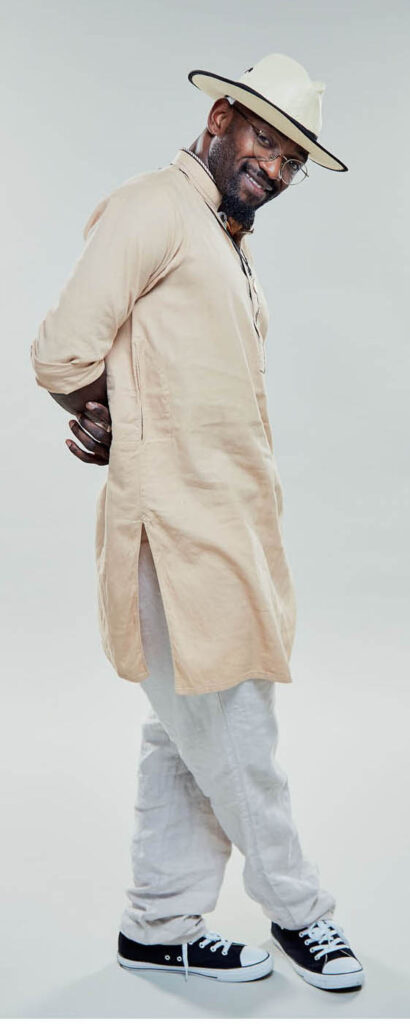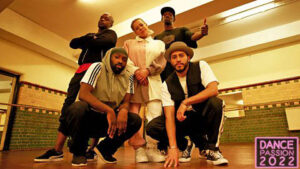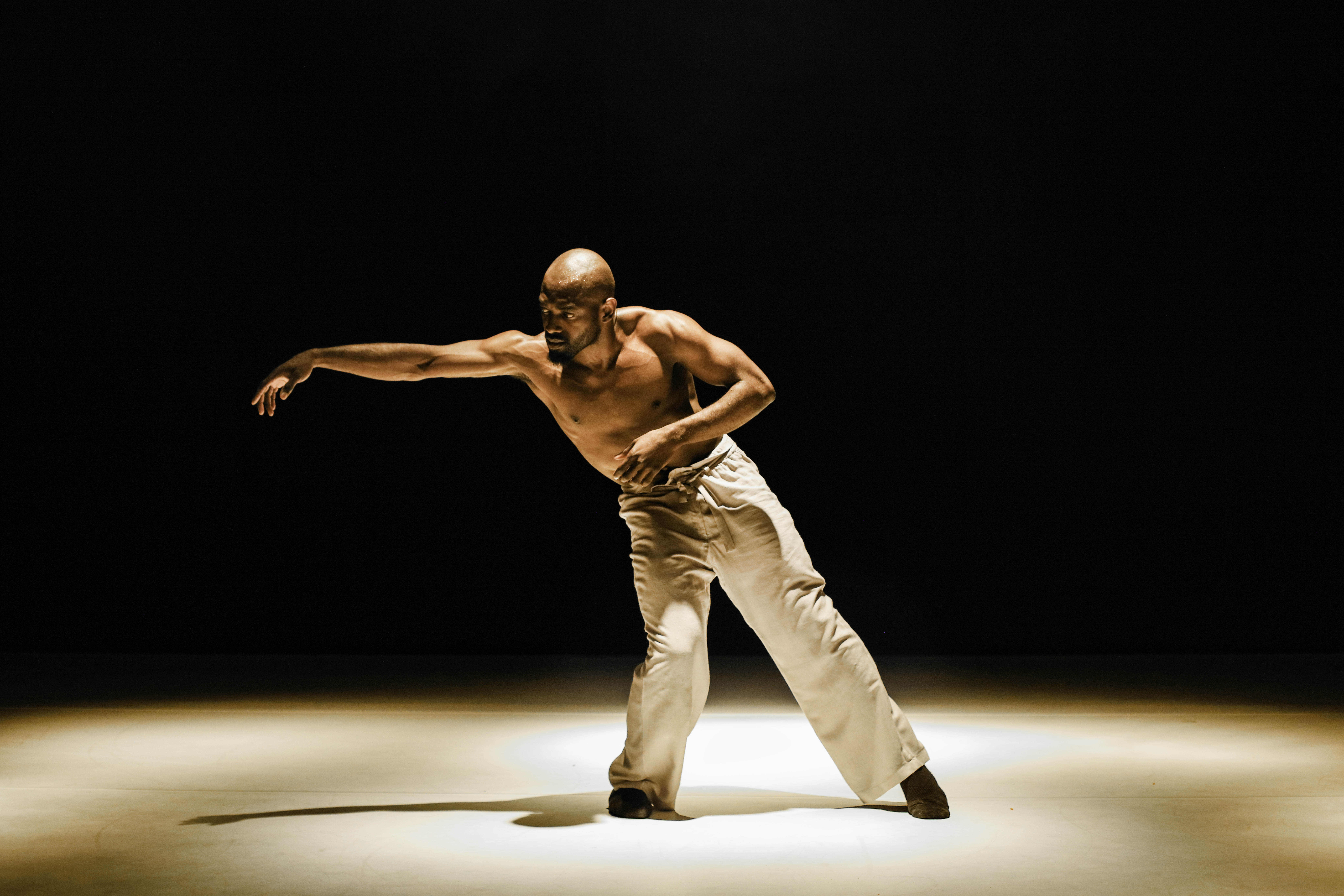In an athlete of the gods THEO PANAYIDES finds a can-do, tough-minded dancer combining an African upbringing with a Western mentality, still searching for something new in his chosen art form
Dickson Mbi was Lucozade Man. This was back in 2012, when he was winning international street-dance tournaments with his ‘battling crew’ Prototype – they won a clutch of contests, first becoming world champions at the SDK Street Dance Kemp in the Czech Republic – and the sports drink decided to make him the face of ‘Lucozade Revive’.
“It was a big campaign,” he recalls, sitting in the cafeteria of the Rialto Theatre in Limassol. “I was everywhere in England… Even my mum was calling me, telling me ‘I saw you on TV’!” Looking at the 30-second ad now, on YouTube, it doesn’t seem like he’s doing very much, beyond being shirtless and moving with a kind of slowed-down precision; clearly, the company borrowed his hip-hop energy – and the cachet it provided – while toning it down for a mainstream audience. Wasn’t it almost a kind of exploitation? “This is how it is, man,” he shrugs. “This is the world. I live in this world, I don’t live in a cocoon.” Dickson grins. “Like I said to you, it’s contemporary show business, my friend. You can’t get too personal.”

He seems fit enough, shaking my hand in the empty cafeteria then taking the opportunity to stretch his legs as I fiddle with my tape recorder. (He stretches again, against the wall, at the end of the interview; he has a show coming up.) His style is warm, informal, naturally confident. “Self-belief is something we all have in our family – all my brothers, my sister. So I believe in myself a lot. Being competitive in a household of five kids is important, man!” He had long hair – almost like a girl’s – when he arrived in London from Cameroon at the age of 12, but now (at 36) his head is shaven beneath a flat cap. It doesn’t look like he absolutely has to shave it, I point out; he’s not bald, just balding. “Nah, bro!” laughs Dickson. (‘Man’ and ‘bro’ are constant punctuation tics.) “When you start gettin’ the bumps you gotta keep it one level, my friend!” He laughs again, running a rueful hand across his dome.
Getting older is a frequent motif in our conversation. The old crew, Prototype, have moved on nowadays. Summertime was always competition time – but it’s “different priorities now”, two of the five have kids and a third, Dickson himself, is about to join them; his wife back in London (a dancer-choreographer, like him) is seven months pregnant. ‘Duende’ is contemporary dance, a shift from the street-dance battling that made him famous. 36, I muse, trying to be discreet; isn’t that – for a dancer, I mean – slightly on the…?
“On the what?” he smiles, as if challenging me to say it.
On the older side?
“Mmm, I think it’s on the experienced side.” It varies, of course; ballet dancers might indeed start to think about retirement – “but if you do contemporary dance, your peak time is from age 35 to 45”. Maybe he’ll focus more on choreography in a decade or so, “have a little sit-down,” as he puts it – “but at the moment I still really enjoy being onstage, and just feeling. Being onstage, man! Expressing, connecting with people. There’s nothing like it, man. I feel alive.”
He came late to dance, in his late teens, and even then it was fortuitous: “It was because I met a girl, she got me involved with the street dance. Just like that”. He followed the girl to a dance class – but it was no good, “I couldn’t pick up the routine. I walked outside and I saw a group of guys doin’ popping – and that was it, I was like ‘This is what I want to do’. And then I just went every Saturday, met those guys and practised outside with them”. Popping was his thing, his signature move (his wife, also from the street-dance world, specialised in a style called waacking) – but he also brought a competitive edge to popping battles, honed from years of playing football (he played for West Ham under-16s, though “I wasn’t that good, to be honest”) and his upbringing in general. Dickson’s mum was a former track-and-field runner, his dad a well-known tailor with his own company; both moved to London when the boy was six – Dad had been invited by a British firm to make suits for them – so Dickson went to boarding school in Cameroon for six years, teaching him much about “taking care of yourself, being disciplined”.
He’s always been confident, competitive, disciplined. In short, he’s always been an athlete – even before he became a dancer, but especially after. “There’s a choreographer called Martha Graham,” he tells me, “and she said: ‘We [dancers] are the athletes of the gods’.”
Dancing wasn’t seriously on his mind, though, not even after he’d discovered popping. West Ham had released him at 16; he’d done A-Levels, not too successfully, then found a job as an IT technician – a secure job, so his parents were happy, but not a fulfilling one. Street-dance battles were for weekends, an extension of playing sports – there was even “trash talk”, as in boxing, trying to psych an opponent out and make them lose confidence – and Dickson was dubious when a teacher named Stuart Thomas recommended that he go to dance school. “As an African person, y’know – you don’t go to dance school, bro! There’s no school for dance, you just dance or you don’t dance. You don’t go to someone to teach you how to dance, that doesn’t make sense.”

That’s another refrain in our conversation, Dickson making himself sound more macho and practical-minded – more down-to-earth – than perhaps he really is. He’s reluctant to talk very much about a dancer being an artist: “My teacher always told me, ‘Dickson, this is contemporary show business. You’ve got to remember that’”. Even the idea of this being his vocation is shrugged off casually – even as he trains like an athlete, and abstains from drinking or smoking, and has been vegan for the past 12 years: “I dunno, my friend… I’m a dancer now, choreographer, but I don’t even know if this is the thing. I mean, I love dancing, it’s my passion, this is everything to me right now – but that’s how I felt about football too. Life is just about moments, y’know what I mean? You’re here right now, this is what you’re doing, you give it all – but then tomorrow, things might change.”
His worldview is an athlete’s in general, can-do, tough-minded – and, again, down-to-earth. He and his wife have a history: they’ve been married one year, but have been together 12 years – and they also broke up for two years before realising, as he puts it, that “there’s a Disney way of being in a relationship and a real way of being in a relationship, and the West has pushed a lot of the Disney way”. People need to grow up, is Dickson’s point. He hears millennials saying disapprovingly that they’ve never seen their mum and dad kiss, as if that diminished the parents’ love for each other – but that’s Disney mush, it isn’t real. “Me paying rent shows you that I love you, love!” he proclaims gruffly, in response to an imaginary complaint from his partner – though of course “I do kiss,” he adds quickly.
He’s also quite hard-nosed when I mention how bad things are for the younger generation, how bleak their future looks. “There’s much more opportunities now for young people,” disagrees Dickson (he’s thinking of things like becoming a YouTuber, or selling your music online). “It’s just about having the mindset, the discipline.” He recalls a phrase his dad used to say: “A day gone can never be recalled”. His own days are chock-full, and focused on work. He trains hard (or did, till Covid made him lazier; he needs to get his mojo back), and keeps himself fit. Surely he has a secret vice? What does he do to reward himself, when things go well? He thinks about it: “I have a ginger beer,” he replies at last. “It’s got a lot of sugar. I have it as a treat.”
There’s something else too, the question of race – a question on which he’s matter-of-fact, as he is on relationships and secret vices (and being an artist). Dickson doesn’t neglect or deny his African roots – he recalls seeing a Pina Bausch production of The Rite of Spring done by black dancers, and feeling profoundly emotional at the sight of the stage taken over by African bodies – but he has no rancour, no anger, no experience of racism to speak of. “I represent both cultures. I have an African upbringing, but I have a Western mentality.” He cites Political Mother by Hofesh as another, very in-your-face dance production that left him exhilarated – but he himself isn’t in-your-face, or political. “Nah, man, I stay away from that… I’m a black guy, I don’t need to put my hand up and say ‘I’m black’. I don’t need to fight for it – I’m already on stage, that’s fight enough. But that’s my own feeling,” he adds, conscious perhaps of not quite fitting the current narrative.
In the end, he may be more about pure artistic expression than he likes to admit – and street dance, too, is very much an art form, especially the way Prototype did it. “We changed the way street-dance comps were happening, because we had a routine for every round,” recalls Dickson gleefully. “We had combos upon combos!… We just had” – he snaps his fingers in rhythm with the words – “stuff and stuff and stuff. It was like if you’re coming to war, you’re coming with a knife and we’ve come with a machine gun, we’ve come with a machete, we’ve come with loads of different things!”. The metaphor is telling – battle, war, aggression – but again, he insists, there was no anger (the whole idea of hip-hop being ‘from the streets’ is usually the media trying to “make it look like it’s not a worthy art form”). Instead there was energy – and choreography so complex it must’ve taken days to perfect, hours of practice on the dancefloor-slash-training-ground.
He’s still involved (and famous) in the world of street dance, doing workshops and judging competitions – but ‘Duende’ is his first solo, a harbinger of a new chapter in his life. It doesn’t matter, so long as it’s dance. “As human beings, we get to connect to something that’s bigger than all of us,” he marvels – shedding his down-to-earth mien for a moment – about the experience of watching dance, or live theatre in general. Did I know that (according to research) the hearts of people watching the same performance beat in sync, without them even realising it?
“Your system connects to something. Y’know? It’s quite deep – but also not that deep, because it’s just a performance also.” Dickson shrugs, just a regular guy again. “This is some deep stuff, and I don’t want to get too… But I know that once you connect with people, my friend, they connect with you”. An athlete of the gods, and humans too.







Click here to change your cookie preferences